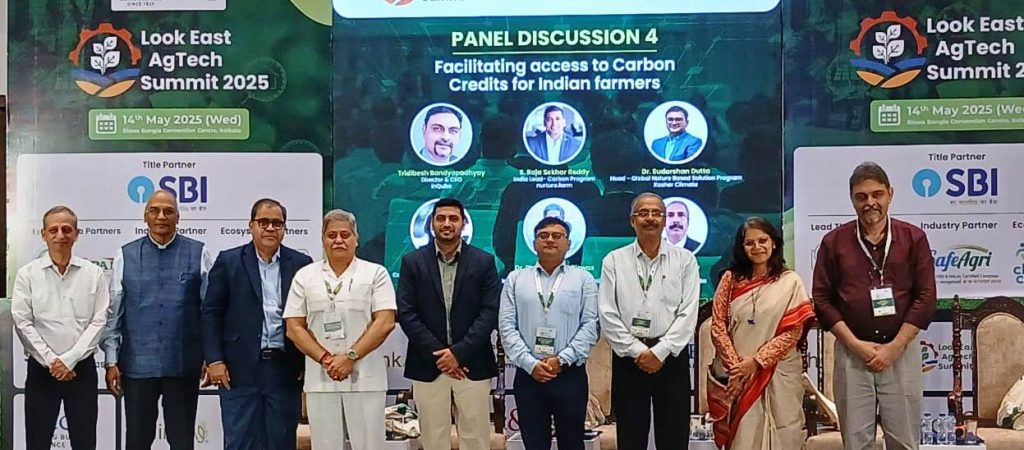
At the Look East AgTech Summit 2025, hosted at the Biswa Bangla Convention Centre, Kolkata, a landmark panel discussion titled ‘Facilitating Access to Carbon Credits for Indian Farmers’ spotlighted the urgent need and tangible solutions for integrating small and marginal farmers into India’s emerging carbon credit ecosystem. The session brought together voices from across the agri-tech and sustainability landscape – policymakers, startups, ICAR institutions, and grassroots organizations – with a unified call for multi stakeholder collaboration and field ready innovation.
Moderated by renowned soil scientist and ICAR-ATARI, Kolkata Director Dr. Pradip Dey, the discussion on ‘Facilitating Access to Carbon Credits for Indian Farmers’ highlighted the that any successful carbon initiative must begin with validated, affordable models tailored to India’s agro-ecological diversity. Delivering a powerful address, Dr. P. Das Biswas, Founder Director, Inhana Organic Research Foundation (IORF), outlined a structured, scalable, and science-backed roadmap for achieving Net-Zero in agriculture. Dr. Das Biswas introduced two such models – Corporate Net-Zero and Clean Food Carbon Neutral – which have been developed through years of fieldwork and refinement. These models integrate Novcom Composting Technology for Soil health & Nutrient Management and IRF Technology for Plant Health Management, forming the backbone of sustainable, carbon-neutral agriculture for smallholders. Dr. Das Biswas, in response to the question, emphasized that ensuring and enhancing the natural and voluntary participation of small and marginal farmers in carbon markets requires a collaborative framework involving four key stakeholders:
- organizations responsible for developing Agri-Net Zero models and technologies
- NGOs, FPOs, and Agri-startups for grassroots dissemination and farmer engagement
- Third-party auditors to ensure regulatory compliance, and
- Corporate entities providing resource inflow through CSR, ESG, and Net Zero initiatives.
A major breakthrough highlighted during the session was the recognition of Nadia KVK (BCKV) as India’s first Agri-Net-Zero KVK – a landmark achievement resulting from the real-world implementation of Agri-Net-Zero models developed by ICAR-ATARI, Kolkata & IORF. This collaborative success demonstrates the feasibility of grassroots-level climate action and serves as a national proof of concept for scalable, farmer-centric carbon neutrality. To support accurate measurement and validation of carbon outcomes, Dr. Das Biswas presented the Agriculture Carbon Footprint Assessor (ACFA), India’s first indigenously developed carbon assessment tool. Now in its second version, with ACFA-3.0 under development, the tool provides Tier-3 precision tailored to Indian agricultural systems and is internationally recognized, reviewed and supported by i-NO Carbon, a UK – based certification body, – enhancing its credibility for global carbon offset initiatives involving Indian farmers.
In addressing the role of startups and enablers, Dr. Das Biswas urged them to adopt validated, ready-for-deployment models, integrate indigenous carbon auditing tools like ACFA, and partner with corporates through CSR & ESG platforms. He underscored that Indian agriculture is home to over 85% small and marginal farmers, and unless technologies are simplified, affordable, and transparent, participation in carbon markets will remain out of reach. Dr. Pradip Dey concluded by noting that, Agri-Net-Zero is not an aspirational concept, but a scientifically grounded and socially inclusive solution to pressing challenges like climate change, food insecurity, and rural livelihood stress. With alignment to SDG 2 and the support of validated models, robust metrics, and credible certification systems, this approach offers India a real opportunity to lead in climate-resilient, carbon-neutral agriculture. Dr. Dey highlighted that LEATS 2025 could serve as a critical turning point – bringing smallholders to the forefront of the green economy as active participants rather than passive beneficiaries.

